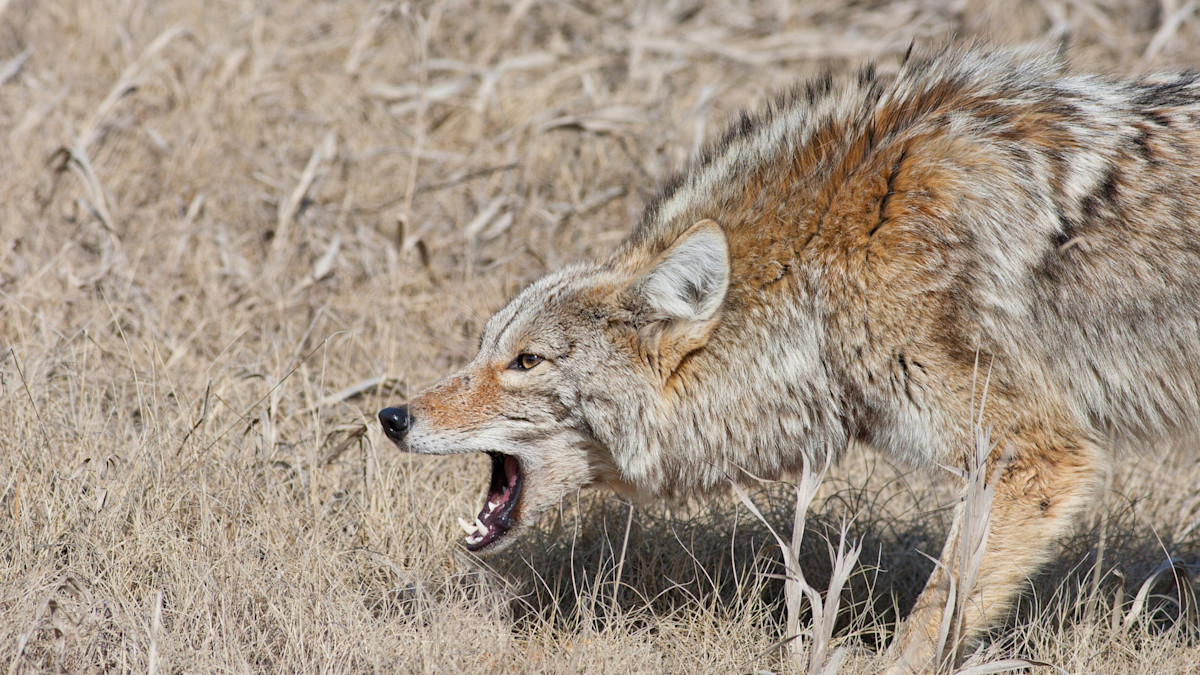
A Rhode Island man made national news this week after he was bitten by a rabid coyote and then choked it to death with his bare hands.
Local media reports that the 58-year-old man was hiking in Snake Den State Park in Johnston when the coyote ran up and bit him in the leg. But the man was able to wrestle the coyote to the ground, pin it by its neck, and suffocate it, police said.
“It’s insane, but I would have done the same thing,” Dennis Northup, a nearby resident, told WJAR. “Who knows what it could have done to him if he didn’t do what he did.”
Rabies is a likely culprit of any coyote attack, but officials at the Rhode Island Department of Environmental Management (DEM) were especially concerned because another attack had been reported just a day earlier in the nearby town of Scituate. In that incident, the coyote attacked a dog walker just four miles from the location of the Johnston attack.
The dead coyote tested positive for rabies, and bite mark analysis is being conducted to confirm that it was the same coyote. Both attack victims are recovering from their injuries.
“Along with my peers at RIDOH, I urge anyone in Scituate and Johnston who may have come into contact with the coyote to call the RIDOH Infectious Disease division,” said Rhode Island State Veterinarian Dr. Scott Marshall. “If pet owners in these two communities believe their pet has interacted with coyote, call or visit your veterinarian to make sure your pet’s rabies vaccination is current. Rabies is virtually always preventable with the vaccination. Animal owners also need to report the exposure to your local animal control officer.”
Deborah Domaingue frequently hikes in the park, and she told MeatEater she plans to continue doing so after this incident. But she said that even though she rarely hikes at dusk and has never seen a coyote in the park, she still carries a knife, pepper spray, and dog spray.
“We are always prepared but you never know,” she said.
Coyote attacks are rare, but this incident has prompted some Rhode Island residents to criticize how the state manages the species. Of the four comments under the Rhode Island DEM’s post about the incident, two blast the agency for restricting coyote trapping.
“Shame on dem ri [RI DEM] for banning leg hold traps, we can’t even trap them, it’s impossible,” said Facebook user Joe Wyman.
User Sam Howarth also chimed in. “This will keep happening unless footholds or collarums are legalized for use in RI,” he wrote.
Howarth elaborated on his comment in an interview with MeatEater.
"Cable restraints and snares are illegal in RI so there is no effective way to trap coyotes. They are reluctant to enter cage traps," he said. Hunting coyotes can also be difficult since the state restricts shooting hours and method of take. The result is that there is "no shortage of coyotes."
"I feel there is a somewhat negative sentiment toward trapping in RI although I have yet to have a negative encounter," Howarth said.
The Rhode Island state legislature banned steel-jawed leghold traps in 1977, and the Rhode Island DEM admits that this regulation limits the ability of residents to trap coyotes.
“The inability to use foothold traps limits the harvest of red fox, gray fox, and coyote, as foothold traps are the only effective and practical means to capture these wary species,” the agency says in a trapping guide.
In 2019 and 2020, the latest data available, Rhode Island trappers harvested eight coyotes out of a total of 428 furbearers. Historic data indicates that trappers can harvest more coyotes, but the number of coyotes trapped never nears that of other furbearers. Twenty-one coyotes were trapped each year in 2011 and 2012 during a brief spike in pelt prices, but that is the most canids ever harvested in a year by Rhode Island trappers.





Conversation